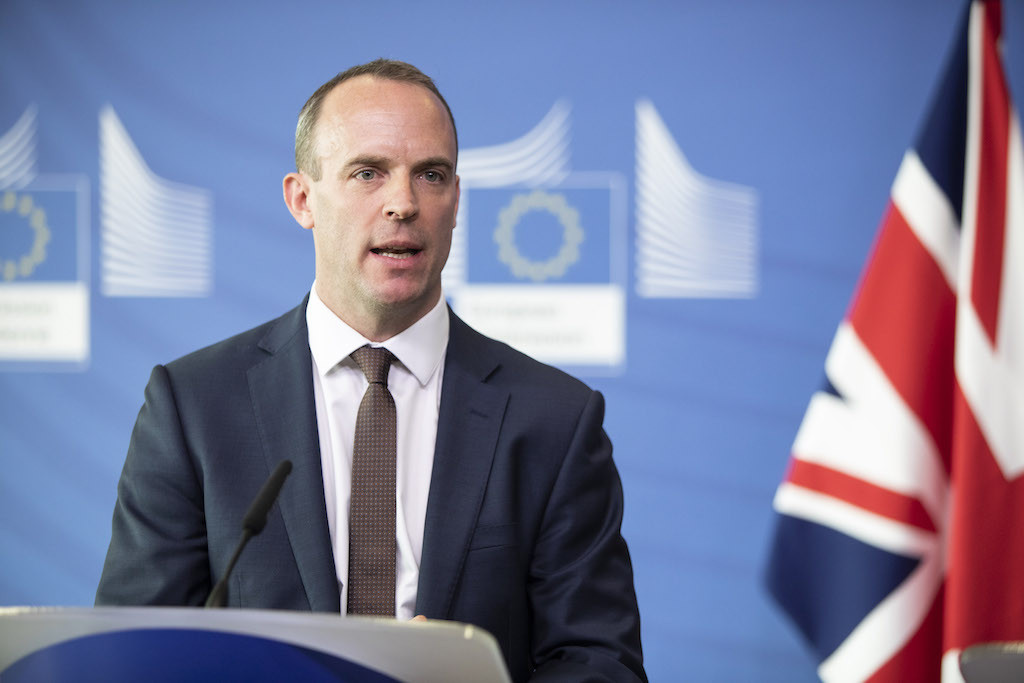Britain would take unilateral action in the event of a no-deal Brexit to keep trade and transport flowing freely, Dominic Raab will pledge.
In a speech coinciding with the publication of the first batch of technical notices laying out the government’s contingency plans for a no-deal scenario, the Brexit secretary will say that Britain would not risk triggering a tit-for-tat battle with Brussels by imposing new border checks or travel restrictions.
“Our overarching aim is to facilitate the smooth, continued functioning of business, transport, infrastructure, research, aid programmes and funding streams,” he will say.
“In some cases, it means taking unilateral action to maintain as much continuity as possible in the short term in the event of no deal – irrespective of whether the EU reciprocates.
Whitehall departments are publishing more than 20 of the technical notices, the first batch of more than 80 from across government aimed at informing businesses and the public about what would happen if the government failed to reach agreement with the EU27.
Responsible European neighbours
In his speech, Raab will add that the government would continue to behave as “responsible European neighbours, partners and allies”. He will say ministers would retain the right to diverge from EU rules “when we are ready, on our terms, in the UK national interest, and when it’s right for the British people”.
Joe Owen, associate director of the Institute for Government thinktank, said in some areas maintaining the status quo would be the only feasible option in the short term in a no-deal scenario.
It would be difficult to begin operating a new immigration regime for EU citizens, for example, because the Home Office would not yet have had a chance to register the millions who were already here. “In effect, freedom of movement would have to continue in the short term.”
In some areas such as farming – where the government’s Rural Payments Agency already administers EU subsidies, and the Treasury has pledged to maintain the budget at its current level for this parliament – achieving continuity should be relatively straightforward. In others, the way the EU27 responds will be crucial.
Raab took over from David Davis, who resigned last month saying he could not support the position set out in the government’s Brexit white paper .
Vim and vigour
Raab has repeatedly pledged to bring “vim and vigour” to the talks, and allies say he will be spending considerably more time in Brussels than his predecessor.
Cabinet ministers agreed at their July away day to step up preparations for no deal, which a group of ardent leavers on the Conservative backbenches believe would be preferable to the white paper approach, with its “common rulebook”.
The foreign secretary, Jeremy Hunt, warned in the Netherlands last week that parting from the EU on unfriendly terms would be “a huge geostrategic mistake,” in “a period where the world is increasingly unstable”.
Businesses have become exasperated in recent months at the government’s failure to spell out how it would avoid chaos in a series of key areas of the economy currently underpinned by EU regulations and institutions.
Adam Marshall, director general of the British Chambers of Commerce, said: “Our test for the government’s no-deal notices is straightforward: do firms now have the clarity they need so that they can continue to conduct business both here at home and across borders on 30 March 2019?”
The shadow Brexit secretary, Keir Starmer, said exiting without a deal would be a signal that the government’s negotiating strategy had been a “complete failure”.
“No deal would be catastrophic for people’s jobs, the economy and for the border in Northern Ireland,” he said. “With time running out in the negotiations, Labour urges the government to drop the dangerous rhetoric and prioritise securing a final Brexit deal that puts jobs and the economy first.”
By Heather Stewart Political editor
